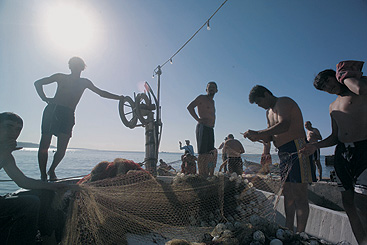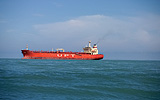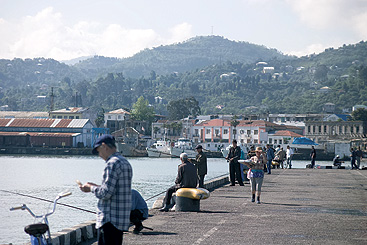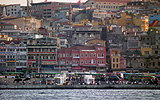
New EU members bring their own sea:
good news or bad?
As Romania and Bulgaria pack their bags to head to Europe, a third passenger is preparing for the journey. With the long-awaited accession of these two countries, the Black Sea will also, on New Year‘s Day 2007, come within the geographic and legal boundaries of the European Union.

At its peak, the collapse of the Black Sea ecosystem was estimated to be costing the region more than €500 million a year in lost fishing and tourism revenues.
One of the most landlocked seas in the world, the Black Sea is almost entirely isolated from the world‘s oceans and, as a result, is extremely fragile and vulnerable to the impacts of human activities. It is also one of the most naturally anoxic, or oxygen-
starved, seas on the planet. Although the sea is as much as 2000 metres deep in parts, only a thin top layer of about 200 metres is alive even at the best of times.
 Due to poor farming practices in the past and untreated wastewater, the Black Sea is one of the most naturally oxygen-starved seas on the planet.
Due to poor farming practices in the past and untreated wastewater, the Black Sea is one of the most naturally oxygen-starved seas on the planet.During the 1970s and 1980s the entire North-West Shelf ecosystem of the Black Sea suddenly collapsed and many thought the Black Sea might be the first sea to ‘die’ in the sense of ceasing to support typical marine life. Every year thousands of tonnes of nitrogen and phosphorous enter the sea because of poor farming practices and untreated wastewater. These nutrients can stimulate blooms of phytoplankton and create ‘dead zones’ where other marine life is starved of light and oxygen with disastrous consequences for the health of the entire ecosystem. At its peak this environmental disaster was estimated to be costing the region more than €500 million a year in lost fishing and tourism revenues.
Ivan Zavadsky, UNDP/GEF Regional Programme Director for the Danube/Black Sea Programme, says there have been recent signs of environmental recovery. This is largely attributed to the economic downturn that followed the break up of the former Soviet Union and the decline in intensive farming and the high levels of fertilisers that had been draining into the Sea during the 1970s and 1980s. But, as Zavadsky says, economic collapse and good luck do not provide a good strategy for managing the Black Sea environment.
“Unless governments make the necessary investments to improve their farming practices and wastewater treatment systems, economic recovery could trigger another environmental disaster, with possibly almost no subsequent chance of recovery,” he says.
Governments working together. Zavadsky emphasises that the real test will be how the countries of the Danube and the Black Sea deal with economic recovery. This means governments cannot afford to repeat the policies of subsidisation that encouraged over-fertilisation in the Soviet bloc days when thousands of tonnes of excess nutrients entered the sea as run-off through ground and surface waters. Instead, says Zavadsky, subsidies should, if anything, be used to encourage environmentally friendly agricultural practices.
According to Zavadsky, Black Sea governments have already established the necessary policy platforms to promote regional cooperation and stimulate the required capital investments to protect the Black Sea ecosystem. In 1992 the Black Sea coastal countries of Bulgaria, Georgia, Romania, Ukraine, Turkey and the Russian Federation signed the Bucharest Convention and formed the Black Sea Commission on the Protection of the Black Sea Against Pollution. In 1996 the countries also signed an ambitious Strategic Action Plan for the Protection and Rehabilitation of the Black Sea. Unfortunately the strategic goals and targets contained in the plan have proven somewhat harder for individual countries to implement.
What EU status will mean to the region. Zavadsky describes the Black Sea‘s impending European status as “a great incentive, a great driving force for cooperation on the Black Sea”. While not expecting unlimited amounts of European funds to flow into the coffers of the Black Sea Commission, he says that with the access Sea commitments and share their Black Sea experiences. “As an example I want to stress that Romania has solved all its urban wastewater discharges into the Black Sea and thus in this moment all of this kind of water is treated before being discharged into the Sea.”
But none of these improvements come without significant costs to these coastal countries. For example in a television interview in November 2005 Turkey’s Environment Minister, Osman Pepe, said the country would have to invest up to €35 billion euros in environmental projects in order to meet standards set by the European Union. Improving the management of wastewater will be one of the toughest challenges in Turkey’s efforts to align with EU environmental norms. Pepe estimated the country was still releasing some 65% of its wastewater into the seas without treatment.

The Black Sea Ecosystem Recovery Project organised a survey of 400 people living in coastal towns and cities and found that one of the biggest obstacles to protecting the ecosystem may be the public’s low awareness of the environmental problems facing the Black Sea.

Raising public awareness. Although ten years have passed since the signing of the Strategic Action Plan, low public awareness of the environmental problems facing the Black Sea remains one of the main barriers to protecting this important ecosystem. This was confirmed in July this year when the Global Environment Facility-funded Black Sea Ecosystem Recovery Project worked together with a number of non-government organisations to survey 400 people living in coastal towns and cities in all six coastal countries.
Over 90% of the respondents said the health of the Black Sea was an issue that was important to them personally and more than half said it was an issue that was very important to them. Strikingly, given the poverty in many of the surveyed areas, nearly 80% of all respondents said they would be prepared to pay extra money towards improving the Black Sea environment. However only 9% acknowledged that poor agricultural practices were having a negative impact on the health of the Black Sea.
Zavadsky feels that increased public awareness could lead to increased pressure and greater political will at the policy-making level. However, he added that in the Black Sea region, more than in the case of the Danube, there was a lack of capacity on the part of local governing bodies, enforcement authorities and policy makers.
Despite these limitations, the Black Sea has made the journey from the intensive care unit to the recovery room. The Black Sea is “on its way”, says Laurence Mee, Director of the Marine Institute and Professor of Marine and Coastal Policy at the University of Plymouth, and “part of the EU‘s responsibility is to keep it on its way”.
Mee adds that the world must consider the sea as important if it regards all marine areas as global assets. January 1, 2007, when the sea officially comes to the EU, will provide an important opportunity to enhance that global response.
Disclaimer
The information contained in the ICPDR website is intended to enhance public access to information about the ICPDR and the Danube River. The information is correct to the best of the knowledge of the ICPDR Secretariat. If errors are brought to our attention we will try to correct them.
The ICPDR, expert group members, nor other parties involved in preparation of information contained on this website cannot, however, be held responsible for the correctness and validity of the data and information provided, nor accept responsibility or liability for damages or losses arising directly or indirectly from the use of the information conveyed therein.
Only those documents clearly marked ICPDR documents reflect the position of the ICPDR.
Any links to other websites are provided for your convenience only. The ICPDR does not accept any responsibility for the accuracy, availability, or appropriateness to the user's purposes, of any information or services on any other website.
When using the information and material provided on this website, credit should be given to the ICPDR.
